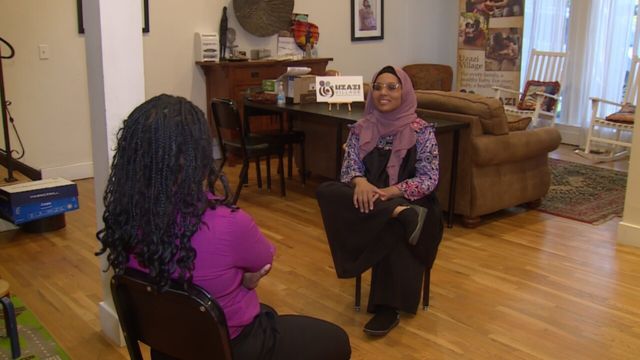When you ask a Black woman about her pregnancy experience, you may notice a recurring pattern in their responses.
Daysha Lewis, a doula at Uzazi Village, shared her personal experience with childbirth. She recalled her first birth experience, which involved being induced. Initially, the induction was categorized as voluntary, but it was presented to her as a necessary medical intervention. Unfortunately, she encountered a postpartum hemorrhage, which put her life at risk.
Nadirah Muhammad, originally from New Jersey, is another mother who has a unique story to share.
When Muhammad discovered she was pregnant with her third child, she was residing in West Africa.
Muhammad expressed the distressing reality of the situation, stating, “We hear similar stories here – stories of death, but these are even more tragic. Women are constantly shuttling to hospitals, only to tragically die en route. The scarcity of blood banks exacerbates the problem, leaving them without the life-saving blood they desperately need.”
Research conducted by health organizations such as the Missouri Department of Health and Senior Services and the Kansas Department of Health and Environment, Bureau of Family Health, has consistently shown that Black women experience disproportionately high rates of maternal mortality.
The MDHSS report reveals that hypertension rates are significantly higher among Black mothers in Missouri, and they face a three-fold increased risk of mortality within one year after pregnancy compared to their white counterparts.
Mental health conditions, including substance abuse disorders, emerged as the primary underlying cause of pregnancy-related deaths. Following closely behind were cardiovascular disease and homicides.
“The gaps exist everywhere, without exception,” stated Hakima Payne, co-founder and CEO of Uzazi Village. “Our healthcare system fails to adequately address the needs of Black and brown women, and it frequently perpetuates racial stereotypes.”
As a former labor and delivery nurse, Payne personally witnessed disparities in the quality of care provided to Black women. This experience motivated her to play a pivotal role in the establishment of Uzazi Village.
The organization offers a wide range of services that are research-based. These services include midwives, mental health resources, a herbalist, on-site dental care, and lactation services.
According to Payne, the main goal is to witness a healthier community, especially because Missouri is failing to adequately support Black and brown mothers.
Mothers play a crucial role in advocating for the transformation of healthcare and improving outcomes for women of color.
“It’s clear that this is a challenging situation for both parties,” remarked Muhammad. “As a Black woman, I understand the difficulties faced when giving birth, as well as the struggles encountered when striving to ensure safe deliveries for Black women.”
Sometimes, you just need a village that has always been there, even if it’s not at Uzazi.
“I am simply an individual from this humble neighborhood,” Lewis expressed. “I was raised in this very corner, and there are individuals here who share my appearance.”
Uzazi Village is approaching its 13th anniversary next month.
The nonprofit organization operates a clothing closet that is accessible to the general public. Additionally, they have established a partnership with a distributor of disposable diapers to assist mothers who are in need of support.
In addition, they collaborated with the city last year on The Doula Initiative, a program that provides free doulas to expectant mothers residing in Kansas City zip codes.
Missouri’s inaugural Black Maternal Health Summit is set to take place during Black Maternal Health Week, from April 16-17, in Columbia. The summit, organized by various entities, aims to address the pressing concerns surrounding black maternal health.



